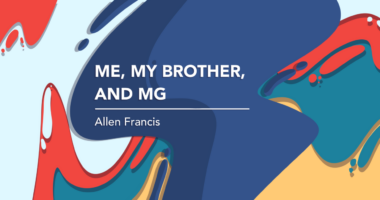Living with MG showed me ‘there are worse things’ than time alone
Isolation can pose challenges, but for me, it also brought many gifts

One of my catchphrases, stolen from my father, is “there are worse things than being alone.” I’ve always known these were borrowed words, but yesterday’s Rare Disease Day provided the impetus I needed to discover their origins.
As I reflected on what the awareness day meant to me, I considered some of the many choices and decisions I’ve made since my myasthenia gravis (MG) diagnosis in 2020. I kept hearing that phrase and wondered if there were a connection between spending time alone and living with myasthenia gravis. Let me share what I learned.
It turns out the quote apparently comes from the poem “Oh Yes” by Charles Bukowski:
“there are worse things than
being alone
but it often takes decades
to realize this
and most often
when you do
it’s too late
and there’s nothing worse
than
too late.”
Until recently, I was ignorant of the second half of the quote. I was floored by how well it describes life with MG.
A difficult disconnect
I’m a very social person who needs interaction with others. Hardly a day passes that I don’t end up in conversation with a stranger. On the phone with a utility representative, at the checkout line in the grocery store, wherever — it seems I’m constantly attracted to new people, and they’re attracted to me. I genuinely enjoy others.
At the time of my MG diagnosis, we were in COVID-19 lockdown. Like so many others, I went in an instant from living an active life that involved daily interaction with a range of people to being limited to my “bubble.” Since little was known then about how the virus would affect those with compromised immune systems, the medical advice was total isolation.
When distancing guidelines eased and the world began to return to some semblance of normalcy, I remained isolated. At first, I worked from home, and then I took medical leave. Of all the challenges I’ve encountered since my diagnosis, this disconnect has been the most difficult.
I learned that many serious medical conditions are linked to isolation, from heart disease to mental health problems. In fact, spending too much time alone isn’t optimal for anyone’s health — especially those of us with rare diseases.
Only very recently did I see that isolation can also be a gift.
What I’ve gained
Enforced isolation provided an opportunity to evaluate my life in a deliberate and reasoned way. I examined some of the choices I’ve made and connected some of the dots that had seemed random. I reviewed good times and bad, mistakes and victories. This process led me to appreciate the value of forgiveness and the beneficial role it plays in our health outcomes. It became clear to me that forgiveness of others begins with self-forgiveness. I had to forgive myself for not always making the best choices. More importantly, I needed to forgive life for sending myasthenia gravis my way.
Spending time alone, away from days filled with social interaction, showed me the real value people bring to my life. I’ve learned to cherish and nurture healthy relationships. The vine that is my relationships has been pruned. Initially, this change bothered me greatly, but now I can see that it allows for new growth.
In addition, isolation and solitude gave me an opportunity to focus on my spiritual life. Through meditation and reflection, I rediscovered an intimate connection with the divine. This insight helps me to see life as a large canvas, like Rembrandt’s painting “The Night Watch.” Up close, it doesn’t seem impressive. Take a step back, consider the whole, and one sees an incredible work of genius. Perhaps I’ve been too focused on MG and was missing the rest of the canvas.
A 2019 article published in the American Journal of Managed Care notes, “Approximately 4% of the total world population is affected by a rare disease at any given time.” This statistic supports the idea that, collectively, rare diseases aren’t rare. What is rare is the ability to take the isolation these diseases can bring and turn it into opportunities for growth. Having done this, I now know that there really are worse things than being alone.
Note: Myasthenia Gravis News is strictly a news and information website about the disease. It does not provide medical advice, diagnosis, or treatment. This content is not intended to be a substitute for professional medical advice, diagnosis, or treatment. Always seek the advice of your physician or other qualified health provider with any questions you may have regarding a medical condition. Never disregard professional medical advice or delay in seeking it because of something you have read on this website. The opinions expressed in this column are not those of Myasthenia Gravis News or its parent company, Bionews, and are intended to spark discussion about issues pertaining to myasthenia gravis.








Leave a comment
Fill in the required fields to post. Your email address will not be published.